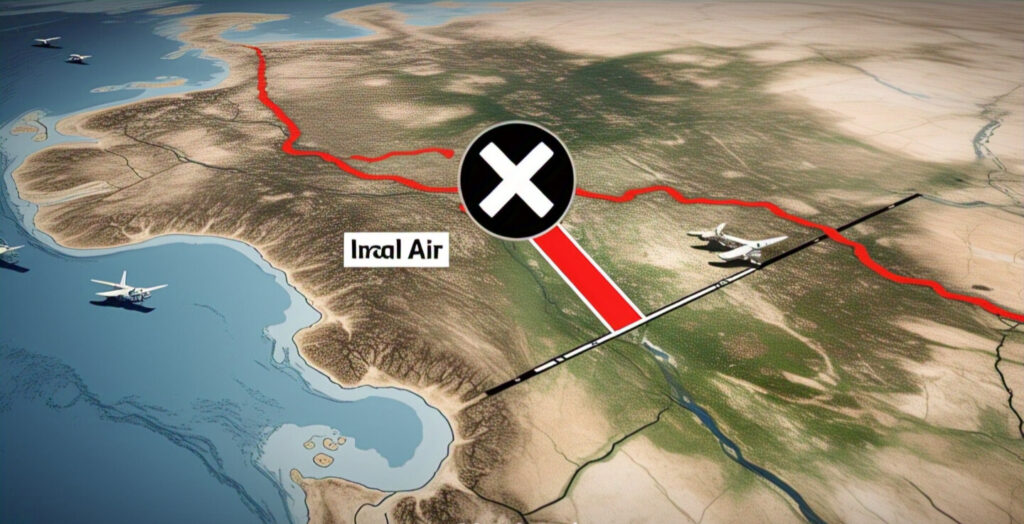Iran-Iraq Airspace Closure Disrupts DXB, Sharjah Flights: Airlines Issue Urgent Updates
In a developing geopolitical aviation crisis, the abrupt Iran-Iraq airspace closure has forced widespread diversions of flights across the Middle East, triggering operational disruptions at major UAE hubs including Dubai International Airport (DXB) and Sharjah International Airport. Airlines and authorities have swiftly responded with rerouting strategies and passenger guideline protocols.
According to Gulf Business, the airspace shutdown emerged due to escalating regional tensions, stoking fears of higher volatility in international travel routes. Emirates, Air Arabia, and flydubai have all issued urgent advisories concerning affected routes between Asia and Europe.
Airspace Closure Impact on Flights and Aviation Traffic
The Iran-Iraq corridor serves as one of the most critical air traffic zones for flights operating between Asia and Europe. Closure of this key artery has necessitated rerouting flight paths over alternative airspaces such as Saudi Arabia, Turkey, and the Caspian Sea, leading to extended flight durations and increased fuel costs.
| Affected Area | Impact | Airlines Involved |
|---|---|---|
| Dubai International Airport (DXB) | Delays and rerouting of long-haul Asia-Europe flights | Emirates, flydubai |
| Sharjah International Airport | Cancellations and revised regional scheduling | Air Arabia |
| Iran, Iraq Airspace | Fully restricted to commercial aviation | All international carriers |
Official Statements from Dubai and Sharjah Airports
Dubai Airports confirmed in an official press release that they are “working closely with airline partners and regulatory authorities,” emphasizing passenger safety as their number one priority. They advised travelers to check flight statuses in real-time through official airline channels.
Sharjah Airport also responded with a comprehensive travel advisory via its official portal, offering support desks and rebooking guidance for affected travelers. Similar updates were echoed by Emirates and Air Arabia.
Airlines Respond to Iran-Iraq Airspace Closure
Emirates issued a statement noting its compliance with ATC regulators and rerouted affected flights, warning passengers of extended journey times. Low-cost operator Air Arabia similarly shifted its India-bound flights to detour routes over the Arabian Sea and northern Gulf.
Regional Tensions Behind the Airspace Crisis
This sudden closure relates to escalating hostility in the region involving Iran-backed militia operations and cross-border security concerns. Additions to airspace restrictions are often triggered by increased military activity, as corroborated by a recent Al Jazeera report.
Previous episodes of similar closures—such as in 2020 following U.S.-Iran tensions—caused hundreds of global flight cancellations. Current conditions mirror those periods in complexity and volatility.
Passenger Advice and Travel Alternatives
Travelers are encouraged to follow real-time flight notifications and explore flexible rebooking offers. Airlines have begun offering re-accommodation options, refunds, and waivers. As a safety-first measure, travelers are advised to stay informed via official platforms.
- Use airline apps for live flight updates
- Direct all inquiries through verified customer service channels
- Monitor geopolitical updates that might affect future travel
You can follow reliable updates through sources like Kashmir News Breaking News or visit our homepage for live regional news. For more insights into regional conflicts, explore stories from BBC and NYTimes.
What Happens Next in Middle East Airspace?
Aviation authorities will continue monitoring the situation with backend intelligence. Operational collaboration with global aviation bodies such as ICAO and IATA is actively underway to ensure network continuity. Until the region normalizes, the Iran-Iraq route will remain closed, placing mounting pressure on neighboring air corridors.
FAQs About Iran-Iraq Airspace Closure and Travel Disruptions
Why is the Iran-Iraq airspace closed?
The closure stems from increased regional military tensions and safety concerns for civilian aircraft.
Which flights are most affected?
Flights between Asia and Europe that typically fly through the Middle East corridor are primarily affected.
Are Dubai and Sharjah airports functioning normally?
Yes, but facing rerouting challenges and minor delays. Normal operations continue with caution.
What steps can passengers take?
Stay informed via airline apps, arrive earlier than usual, and consider flexible travel plans.
When will the airspace reopen?
No official timeframe has been provided. Reopening depends on regional de-escalation.
Do airlines offer refunds or rebooking?
Yes, major carriers such as Emirates and Air Arabia offer flexible rebooking and refunds for affected flights.
Are all Middle Eastern countries involved?
No. The closure directly affects Iran and Iraq airspace, but rerouting affects neighboring countries too.
Can security threats increase flight costs?
Yes. Rerouted paths increase fuel and crew costs, which may reflect in ticket pricing if prolonged.
Is this closure similar to past events?
Yes. Similar disruptions occurred in 2020 during U.S.-Iran tensions.
Are cargo flights affected too?
Yes, both passenger and cargo flights have had to reroute, causing logistical delays globally.
Is traveling via alternative routes safe?
Yes, all alternatives are approved by aviation safety authorities like IATA and ICAO.
Will this affect Hajj or summer travel?
Possible. Airlines are coordinating schedules closely with governments to minimize disruptions.
Where to get official travel alerts?
Visit airline websites, Dubai Airports, and government portals for verified updates.
Has IATA issued a statement?
Not yet formally, but coordination with regional ATCs is underway, per insider reports.
Can travel insurance help?
Yes, comprehensive travel insurance may cover delays and rerouting associated with airspace closure.


